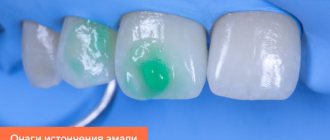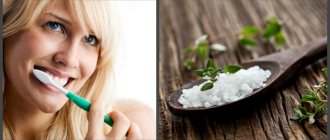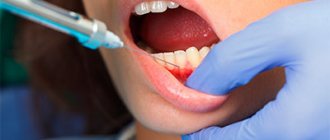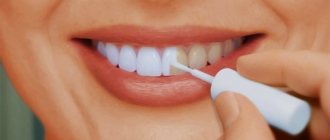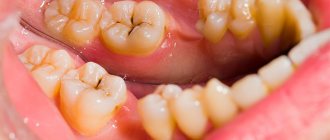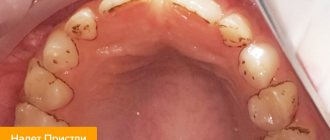Set on edge, set on edge: understanding the concepts
The word set on edge has deep roots; it comes from the old Russian verb “skomite”, which means “whining”, “to hurt”. In its modern meaning, soreness is the name given to painful sensations and a feeling of discomfort in the teeth or tongue. A sore throat appears from exposure of the teeth or oral mucosa to any irritant. Most often, spicy and sour foods. As a rule, an unpleasant symptom goes away quickly after eliminating the irritant (within 30 seconds), but sometimes it persists for quite a long time.
Important! Professional doctors believe that regardless of the frequency and duration of the discomfort, the symptom almost always indicates the presence of some kind of dental problem.
Oskoma or oskomina - what does it mean?
When people talk about soreness, they usually mean some discomfort associated with an astringent aftertaste in the mouth or aching pain in the teeth. Such sensations usually occur immediately after eating acid-containing foods. Sometimes the symptom is accompanied by slight numbness of the mucous membrane - a reaction of soft tissues to an irritant. More often than not, the sensations quickly pass, but it also happens that the soreness remains for a long time and causes serious inconvenience. As a rule, the prerequisite for this phenomenon is precisely hyperesthesia, that is, increased sensitivity of the enamel.
A sore throat is an unpleasant aftertaste in the mouth
The main reasons for the development of dental pathology
When asked why the sore throat appears, doctors, as a rule, answer unanimously - increased sensitivity or, scientifically, dental hyperesthesia is to blame1. Hard tissues respond to various stimuli because they are weakened, demineralized, thinned, or destroyed.
A sore throat appears in your mouth for a reason. Here are the main reasons why enamel and dentin can weaken and begin to react negatively to food acids:
- increased accumulation of hard mineralized plaque and stone,
- serious dental diseases and non-carious defects: caries, pulpitis, periodontitis, erosion, wedge-shaped defect, hypoplasia, fluorosis. The problem can be caused by periodontal inflammation, for example, periodontitis, which in an advanced stage causes recession (loss) of the gums, exposure of the roots and necks of teeth,
- bad household habits: opening bottles with teeth, biting threads, cracking nuts and seeds. Those who bite their nails or constantly hold foreign objects (pens, pencils) in their mouth are susceptible to the problem.
- non-compliance with teeth brushing techniques, use of brushes with hard bristles, abuse of abrasive and whitening pastes,
- destruction of hard tissues due to injuries, impacts and falls,
- eating too cold, hot and hard foods, as well as a love of acidic foods (juice, berries, tomatoes, coffee, apples, sauces, marinades) and sweet carbonated drinks - all this makes the enamel more porous, thins it, contributes to the appearance of erosions,
- changes in hormonal levels and disruption of mineral metabolism: teeth set on edge often occurs in pregnant and lactating women, since hard tissues are weakened due to a lack of beneficial microelements and calcium leaching from the body. The problem also occurs in women during menopause,
- bruxism,
- smoking.
The problem may occur in those who have undergone dental treatment with braces or in people who have had home or even professional whitening done.
Comments
I really love all sorts of sour foods, I adore berries and I eat a lot of them, but I’ve never had a sore throat before... Is it necessary to rinse your mouth after such food?
Alena (04/21/2020 at 03:08) Reply to comment
- Dear Alena, not all people get set on edge, but teeth are gradually destroyed under the influence of large amounts of acid, and non-carious lesions (erosion, for example) may appear on them, so you still need to reduce your intake of sour foods. And yes, you need to rinse your mouth with water after eating such food.
Editorial staff of the portal UltraSmile.ru (04/28/2020 at 09:24) Reply to comment
Write your comment Cancel reply
Why does the tongue set on edge?
Some patients complain not only of teeth set on edge, but also of increased sensitivity of the tongue when eating sour foods. In this case, the pathology may be caused by a disease such as glossitis. In this case, the tongue may have cracks, ulcers or open wounds that bleed or are covered with plaque.
The problem may arise due to injury to a muscle organ as a result of biting, malocclusion, wearing a piercing, or a burn. Due to the presence of damaged and chipped teeth in the mouth, poorly installed dentures, crowns and worn fillings.
Causes
Important! People usually call increased tooth sensitivity as sore throat. In medical terms, this condition is called hypertension. But why does this disease appear, what factors provoke it? A sore throat may occur due to the following reasons:
- presence of carious diseases;
- inflammatory process of periodontium;
- the presence of chips and cracks in the enamel that occur as a result of mechanical stress;
- increased level of tartar accumulation;
- severe abrasion of enamel, for example, due to burxism.
Attention! Unpleasant sensations and pain occur when consuming foods with a high level of acidity - citrus fruits, strawberries, apples, cherries. Also, discomfort can occur when exposed to hot or cold.
These symptoms appear because there are cracks in the teeth, namely in the enamel, into which food particles can get trapped. It is for this reason that it is necessary not only to eliminate the symptoms themselves, but also to strengthen the enamel structure in the future.
Caries, cracks, chips are just part of the causes of sore throat. “Numbness” when set on edge is a normal reaction of the nerve endings of the oral mucosa to an excessive irritant. In some cases, the sore throat is accompanied by pain, is severe and lasts for hours.
How pathology manifests itself at different stages
Doctors say that the appearance of a sore throat, namely pain and discomfort while eating sour food, is not even the first stage of the disease, but the second.
- The first or early stage of enamel hyperesthesia (hypersensitivity) is characterized by the following symptoms: hard tissues react to thermal stimuli, namely cold and hot temperatures of food (drinks).
- If you have the second, or moderate stage, then the tissues react not only to sour foods, but also to sweet, salty, and spicy foods.
- At the third, or advanced stage, pain and discomfort can be caused by any mechanical impact, for example, brushing and eating solid food.
Set your teeth on edge: treating hyperesthesia
September 24, 2012
The topic of caries has already set the teeth on edge for everyone who at least sometimes reads newspapers, watches TV or looks on the Internet. And today we will talk not about him, but about the soreness itself. About the one that makes it painful to eat apples and drink hot tea, as well as lemons, oranges, tangerines, raspberries and cold water... It seems that it’s not a disease as such, but a lot of troubles. Let's figure out why, how and where the sore throat appears and how to get rid of it.
Oskomina is the popular name for hyperesthesia, in this case increased sensitivity of the teeth. It can be a consequence of previous caries, inflammation of the gums, chipped enamel, it can also be caused by increased tooth wear, tartar, and even a change in the microelement composition of saliva. Hyperesthesia manifests itself in the form of acute pain, which lasts up to 30 seconds in the case of a single stimulus. If, for example, you try to drink hot coffee, then these attacks will overtake you every time your tooth enamel comes into contact with a hot drink. Often the sore throat is the name given to sudden sensitivity in one or more teeth after eating a large number of apples (or other sour fruits). We say: “I’ve set my teeth on edge! Why did you eat so much!” But in reality the process is much deeper. If your teeth hurt from hot and sour foods, then this means only one thing: you have dental hyperesthesia. The enamel is not ready for such tests; its treatment and strengthening must be carried out during periods of “calm”, when it seems to you that everything is in order and there are no problems with your teeth. The problems are there, they are just waiting for an opportunity.
Dentists distinguish three degrees of hyperesthesia:
1st degree: teeth react to temperature stimuli (too cold or too hot, and this can be either drinks or just frosty air). 2nd degree: teeth react not only to temperature, but also to chemical irritants (those sour apples, as well as chocolate, dried fruits, sugar and much more). 3rd degree: irritants are chemical, temperature and mechanical factors.
Depending on the degree of sensitivity and its causes, treatment can vary: from simply rinsing the teeth with a soda solution to surgical intervention that corrects the gums. First, let's figure out how you can help yourself at home.
Hyperesthesia manifests itself in the form of acute pain that lasts up to 30 seconds
1. If you feel the first signs of a sore throat, you can try rinsing your teeth with a solution of baking soda (1 teaspoon per glass of water), alkaline mineral water, or drinking milk (room temperature). However, these recipes will be useful only if there is increased acidity in the oral cavity. Neither soda nor milk will save your enamel from temperature shock. If you bite into too much ice cream or take a long sip of an ice-cold drink, try pressing your tongue against the aching tooth: this will help normalize the temperature faster and possibly relieve a sharp attack.
2. As a permanent preventative measure, you can use special toothpastes for sensitive teeth; almost all manufacturers have them. Also, a temporary treatment measure is special varnish coatings that are applied by the dentist. They can also be used at home, but consultation and selection of varnish by a doctor is still an indispensable condition.
3. If, after all of the above, you continue to feel sharp outbreaks of pain with any impact on your teeth, then you are heading straight to the dentist’s chair. The most common procedure is remineralization. The doctor will determine what treatment you need and advise you on how to avoid new symptoms in the future.
Useful tips
Among the popular advice for people with sensitive enamel, there are some rather extravagant ones. So, in order not to deny yourself the pleasure of drinking a sweet or sour cocktail or juice, you can use a straw! The irritant substance will get less on your teeth, which will save you from unpleasant symptoms and allow you to enjoy your favorite drink.
Teeth sensitivity often increases due to neglect of the enamel. Dentists advise you to be more careful with your teeth: do not chew nut shells with your teeth, try not to injure the enamel with hard objects (sometimes you can damage your teeth due to the habit of gnawing on any objects: pens, pencils, combs).
When buying a toothbrush in a store, choose medium-hard bristles: hard ones can damage your enamel, and too soft ones will be ineffective. A similar principle applies when choosing toothpastes: the softest and simplest ones may be powerless in the fight against caries and cracks in enamel, and strong (for example, whitening) pastes may be too aggressive. Even if the whitening toothpaste says it can be used twice a day, it will likely make your sensitive teeth worse.
Even if your teeth are healthy and never hurt from hot, cold or sour foods, don’t get carried away. You should not alternate hot coffee with ice cream or ice juice; even healthy teeth will not withstand such a test and sooner or later you will join the ranks of people suffering from hyperesthesia.
Methods to help relieve the condition at home
If you periodically have a sore throat, then you will find useful tips that will help you quickly get rid of it at home.
Alkaline mouth rinses
Alkaline agents help quickly neutralize the effect of acid. To get rid of sore throat after eating acidic food, simply rinse your mouth with a solution of soda, milk or mineral water without carbonate, but with bicarbonate in the composition.
Eliminating irritating foods from your diet
If you don’t know how to remove the soreness on your teeth, then simply stop eating too sour and spicy foods, or reduce their consumption to a minimum. Remember that acidic foods and drinks are an additional factor contributing to the destruction and erosion of enamel, irritation and damage to the oral mucosa.
On a note! Try replacing acidic foods with ones that have a more neutral acid level. For example, if you like apples, you can choose less sour or not sour varieties.
Drinking sour drinks through a straw
Start drinking freshly squeezed juices and fruit drinks through a straw. This will help reduce the area exposed to the irritating factor.
Strengthening enamel
At home, you can use pastes for sensitive enamel and remineralizing compounds (Sensodyne, ROCS Sensitive Instant Relief or Medical Minerals, Colgate Sensitive Pro-Relief, PresiDENT Sensitive Plus). Today, such pastes are in the line of every budget and premium manufacturer.
It is necessary to strengthen the enamel not only from the outside, but also from the inside. Vitamin and mineral complexes will help with this, as well as foods rich in calcium, phosphorus, potassium and magnesium.
Stages of development of the pathological condition
The sore throat can manifest itself with varying degrees of intensity. Therefore, in dentistry, this pathological condition is divided into the following stages:
- initial – teeth react sharply to temperature factors, including sudden changes,
- medium - at this stage, the enamel becomes susceptible not only to hot and cold, but also to chemical irritants. In such cases, a sore throat on the tongue and teeth occurs immediately after eating foods high in acids or sugars, including apples, citrus fruits, desserts and other delicacies,
- advanced – painful sensations become more intense and appear when exposed to all of the above factors. Pain also occurs with mechanical irritation, for example, while brushing teeth or biting into hard foods.
This condition can occur after eating acidic foods.
Only a specialist can correctly diagnose the stage. You will need to undergo appropriate diagnostics so that the doctor can prescribe adequate treatment. Sometimes light therapy with rinses is enough, but in other cases it is necessary to resort to more radical measures, including restoration with veneers or crowns.
Ways to solve problems in dentistry
Experts believe that it is still better to treat sore throat not at home, but in dentistry. Because only a doctor can conduct a detailed diagnosis and establish the true cause of the problem.
How to remove the soreness on your teeth with the help of a dentist and make sure that the problem does not appear? Depending on the examination results and the clinical situation, the specialist may prescribe the following procedures:
- professional oral hygiene: carried out if there is soft and hard bacterial plaque on the teeth, which is the cause of many dental diseases that provoke increased sensitivity of the enamel,
- fluoridation and remotherapy: after these manipulations, the protective properties of hard tissues increase, their strength and resistance to irritating factors increases. During the procedure, the doctor seals the smallest cracks in the enamel, making its surface smooth and shiny,
- treatment of caries, pulpitis, periodontitis, gingivitis and periodontitis,
- installation of veneers and lumineers: microprosthetics with thin overlays is justified in cases of enamel hypersensitivity and the presence of other minor defects (chips, cracks, stains, gaps between teeth, unsightly shade, slight curvature and irregular shape of some teeth),
- prosthetics with crowns: this radical method is suitable only for those patients whose teeth are severely damaged,
- making and wearing night guards for bruxism,
- correction of bite pathologies with braces, trainers, aligners.
Tips and tricks from experts
We figured out what to do if a sore spot appears on your teeth, and how you can remove it yourself. Now let's move on to the question of how to prevent the development of hyperesthesia and its unpleasant consequences. Here's what experts recommend in this regard:
- Treat your teeth with care and avoid any traumatic factors. When choosing a suitable toothpaste and brush, it would be a good idea to consult with a specialist, and you certainly shouldn’t open bottles with your teeth or crack nut shells,
- maintain oral hygiene, do not forget to brush your teeth twice a day, use floss, preventive rinses and preferably an irrigator,
- Avoid sudden temperature changes in food and drinks. Rinse your mouth after eating sweet and sour foods,
- When the first signs of a problem appear, immediately go to the doctor.
Maintaining oral hygiene will help reduce the risk of pathology.
The most important thing is to seek professional help in a timely manner. Do not put off visiting a specialist if you often experience a feeling as if your teeth are set on edge. This may be a signal of more serious pathological processes that require urgent action. The dentist will help you recognize the problem in a timely manner, so you need to visit him for prevention at least twice a year.
- Bokaya, V.G. Deep fluoridation in the treatment of dental hypersensitivity, 2000.
Treatment of a sore tongue
If your teeth are set on edge, then you now know what to do. But if you are bothered by such unpleasant sensations on the tongue, then, as mentioned above, in most cases this indicates glossitis. There are many types of glossitis (allergic, herpetic, ulcerative, viral, hypertrophic, and so on). Each type of pathology is treated differently. To accurately determine the type and cause of this disease, you need to consult a doctor.
Read the article on the topic: “Symptoms, treatment, dental care for glossitis.”
Depending on the cause of the pathology, the doctor will prescribe a list of medications: antiseptics, antibiotics, ointments and antifungals.
Treatment methods that dentists can offer
Treatment of sore teeth, as a rule, comes down to eliminating their increased sensitivity by strengthening hard tissues through fluoridation and remineralization procedures. If the problem not only causes discomfort, but is also complicated by the loss of smile aesthetics, when the enamel-dentin layer begins to crumble, deteriorate and chip, then the doctor may suggest the installation of veneers and lumineers, and prosthetic crowns.
Fluoridation will help strengthen tooth enamel
As for the sore tongue, the pathology is not always associated with dietary habits; it may be a consequence of inflammation of a muscle organ or a disease such as glossitis. In this case, the patient requires specialized treatment: taking anti-inflammatory drugs and antibiotics, rinsing with antiseptic solutions, ointments for accelerated tissue regeneration.
Read the article on the topic “10 types of glossitis with photos,” which will make everyone wary.
The doctor also treats concomitant diseases, the elimination of which allows you to get rid of the feeling of soreness for a long time, for example, caries, periodontal inflammation, bruxism.
Dental treatment can help resolve the problem
It must be emphasized that in rare cases, the sore throat is caused by cracks in the tongue, the cause of which can be not only mechanical damage and inflammatory processes, but also diseases of the internal organs (for example, the thyroid and pancreas). But in any case, with the problem, you should first contact a dentist, who will rule out pathologies in his area and after that refer you for examination to specialized specialists.
Prevention is easier than cure - measures to prevent the problem
Professional doctors believe that sore throat can be easily avoided if you follow a number of preventive (prophylactic) measures.
Diet restrictions
You should not alternate cold and hot foods or get too carried away with sweet, spicy, salty, and sour foods. It is better to first separate solid foods into several small pieces. It is necessary to exclude from the diet carbonated drinks with phosphoric acid (Coca-Cola, Sprite, Fanta), which destroy and thin the enamel. You should also avoid eating sticky foods, crackers, chips and popcorn.
It must be remembered that teeth set on edge often appears due to careless treatment of enamel, so forget about cracking nuts and husking seeds with your teeth.
Using the right products to clean your teeth and gums
It will be better if you purchase personal hygiene products (paste, type of brush, type of floss and irrigator) after consulting a dentist, who will give valuable advice. The doctor will be guided by the condition of the gums, teeth and mucous membranes, and the presence of certain diseases.
Teeth whitening only in dentistry
Give preference to professional methods and whitening products used in dentistry. Remember that whitening pastes and folk remedies for home use (soda, salt, charcoal, lemon) can cause significant harm to the enamel and mucous membranes of the oral cavity, and the effect will be much more modest than what you get in dentistry.
Preventive measures against sore throat
- Avoid alternating cold and hot dishes (for example, you should not drink ice cream with coffee), and avoid eating too hot food and drinks: temperature changes contribute to the destruction of enamel, the appearance of small cracks, and often become a prerequisite for the development of teeth set on edge. Too hot food also irritates the oral mucosa, which can cause a burn and sore tongue,
- try to eat less sour foods: if you like apples, then you can switch to non-acidic varieties; if you have tea with lemon, then it is better not to add lemon to the drink, but eat it as a bite,
- it is important to avoid carbonated drinks, especially those containing phosphoric acid (Fanta, Sprite, Coca-Cola), as they literally “dissolve” the enamel,
- do not use highly abrasive pastes and do not abuse whitening procedures,
- use hygiene products that suit your clinical case: it will be better if the dentist recommends a brush and paste,
- Do not open bottles with your teeth, do not bite threads, do not bite nails and pencils, do not crush seeds and nuts.
Do not open bottles with your teeth.
Among other things, treat dental diseases in a timely manner. To identify them, it is enough to undergo preventive examinations at the dentist twice a year.
Notice
: Undefined variable: post_id in
/home/c/ch75405/public_html/wp-content/themes/UltraSmile/single-item.php
on line
45 Notice
: Undefined variable: full in
/home/c/ch75405/public_html/wp-content /themes/UltraSmile/single-item.php
on line
46
Rate this article:
( 1 ratings, average: 5.00 out of 5)
language
- Veizay I., Gvozdikova E.N. Increasing the effectiveness of conservative treatment of inflammatory periodontal diseases by optimizing methods of professional oral hygiene // Medical and Pharmaceutical Journal. – 2015.
- Kuznetsova O.A., Gubanova E.I., Shemonaev V.I. Pathophysiology of intolerance to metal dentures // Volgograd Medical Scientific Journal. – 2013.
Consulting specialist
Orlova Elena Vladimirovna
Doctor rating: 9.5 out of 10 (2) Specialization: Dentist-therapist Experience: 32 years
